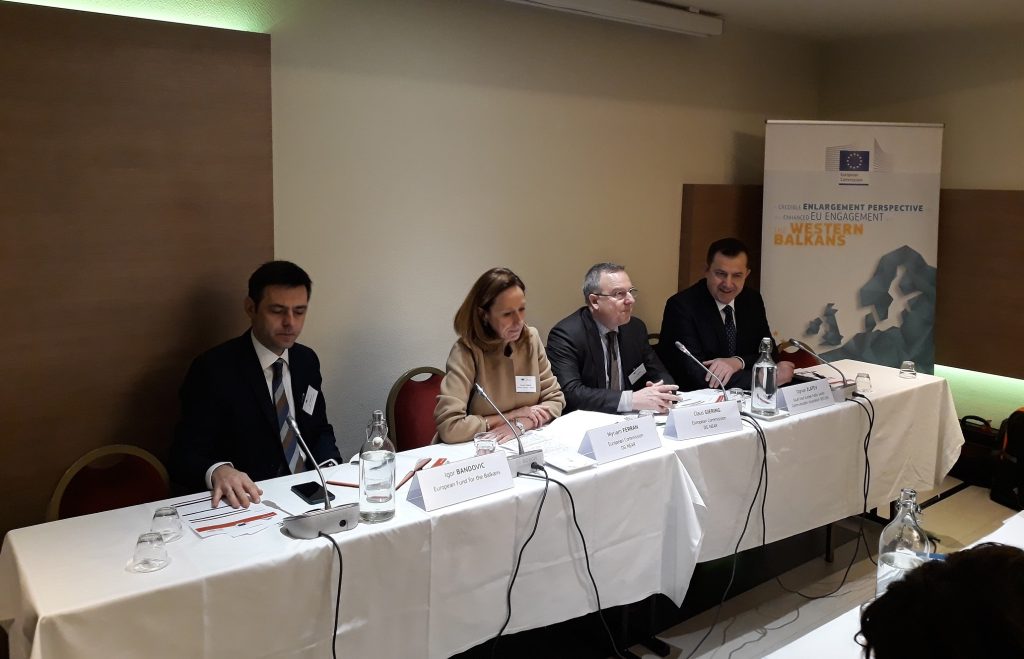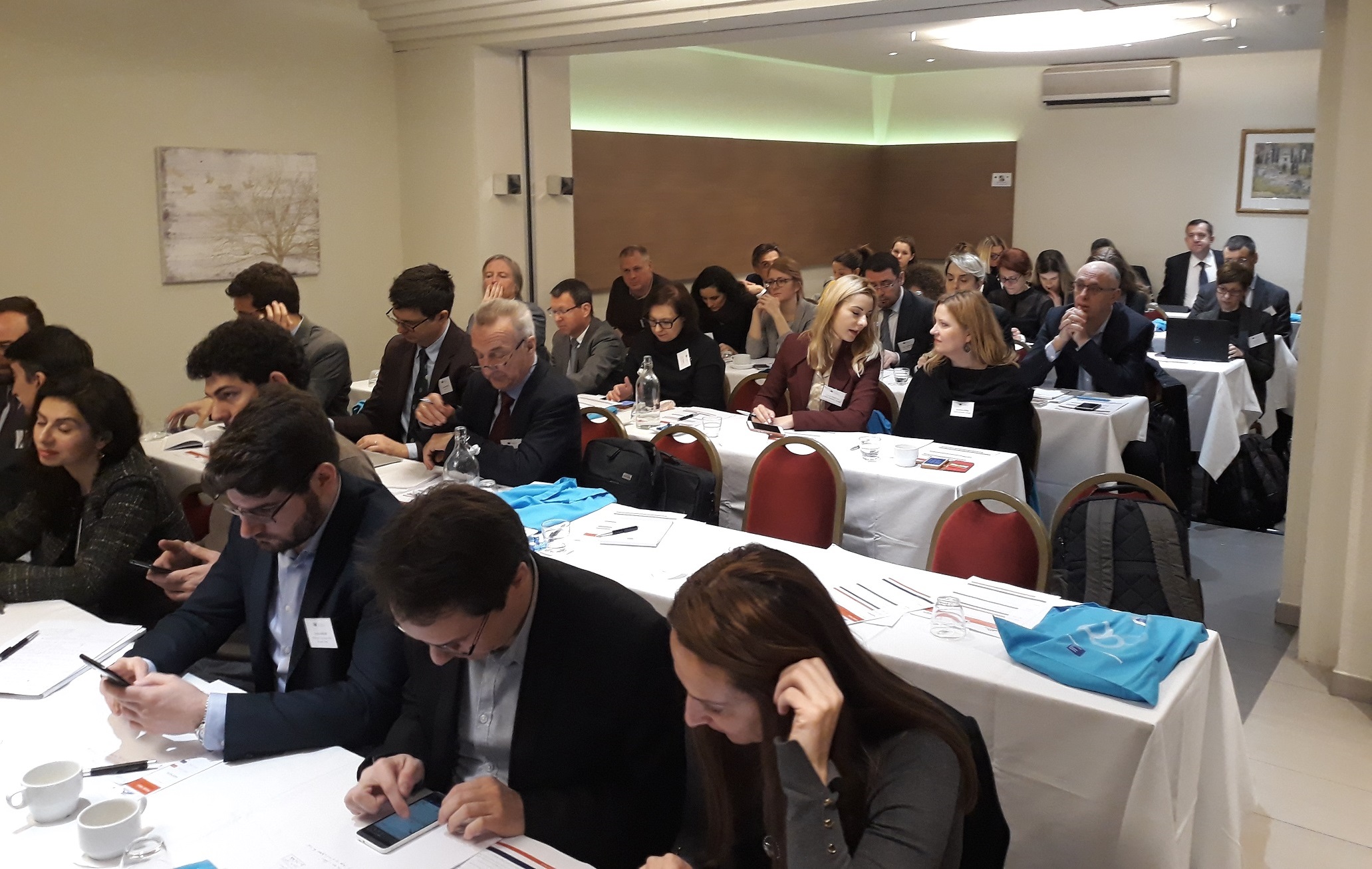A round table discussion on the public support for the EU accession of the Western Balkans took place in Brussels on 5 February 2019, gathering over 70 senior public communicators from Western Balkan governments and EU Institutions, policy makers, experts, journalists and civil society representatives, who offered their perspectives on current challenges and opportunities of communicating the EU path of the Western Balkans.
The event was hosted by SEECOM, in partnership with the European Fund for the Balkans and the Directorate-General for Neighbourhood and Enlargement Negotiations (DG NEAR) of the European Commission.

Myriam Ferran, Director for Strategy and Turkey in the Directorate General for Neighbourhood and Enlargement Policy, European Commission opened the event, together with Ognian Zlatev (SEECOM) and Igor Bandović (European Fund for the Balkans).The opening was followed by two panel discussions presenting the views of the local governments, EU Member States and institutions (Romanian Presidency, DG COMM, DG NEAR and EEAS), as well as think-tanks and media.
The first panel focused on how Western Balkan governments communicate about the EU accession process and the role of the media. During the second panel, speakers discussed how the EU enlargement and the European perspective of the Western Balkans are communicated to the citizens of the EU Member States.
Main ideas of the discussions are summarized below.
Opportunities
The historic Prespa Agreement, as a major good news story for the Western Balkans, provides a significant boost to the region’s reputation and inspires greater enthusiasm and energy for its EU perspective.
In addition, the series of small achievements that all EU aspirants are making in transforming their societies and improving people’s lives through EU accession reforms also creates plenty of opportunity for engaging citizens in the EU accession reforms.
Western Balkan citizens are as European as EU citizens. In this context, the rich cultural heritage and the contemporary culture of the region are major communication assets, speaking convincingly about the European identity of the peoples of the Western Balkans.
Professional exchange among public sector communications is invaluable for sharing best practices and lessons learned about the meaningful engagement of citizens in the EU integration affairs.
Romania’s decision to keep enlargement high on the EU Council’s agenda during its Presidency creates fertile grounds for any efforts aimed at boosting public support for the European perspective of the Western Balkans.
The forthcoming EU summit in Sibiu is an important opportunity to set a clear vision for the future of Europe. Involving aspiring EU members from the Western Balkans in the event would be a major symbolic action, sending a powerful message of the credibility of the vision of united Europe.
The 15th anniversary of the so-called ‘big bang’ enlargement is a good occasion to raise awareness of the benefits of EU enlargement for EU citizens.
Challenges
Throughout Europe, public institutions are struggling to devise effective factually based communications capable of engaging citizens in an increasingly complex media environment, which faces propaganda and disinformation challenges.
The credibility of the EU enlargement policy is put in doubt by the length of the accession journey of the aspiring EU members in the Western Balkans.
On the one hand, effectiveness of communication is clearly directly dependent on the success and implementation of reforms in the enlargement region. In other words, a lack of reforms can never be compensated by communications.
On the other hand, despite the economic and societal value and importance of enlargement, as the EU’s most transformative policy, the efforts that many EU member states invest in communicating enlargement domestically remain relatively low.
In the region, there is a perceived discrepancy between the requirements for EU integration and current reality which in some cases even leads to opinion that ‘the EU is pretending to enlarge, while the Western Balkans are pretending to reform’.
A majority of citizens in all aspiring EU member states are in favour of joining the Union, although many of them (26% on average in the Western Balkans, according to the RCC Balkan Public Barometer 2018) do not believe that membership is ever going to happen.
Media are widely disengaged, as they feel that reporting about EU affairs is not appealing to their audiences. As a result, they are letting the interests of political elites shape the public debate about the EU.
Consequently, EU bashing continues in national politics in both EU member states and the Western Balkans.
Generally, Western Balkan countries have a poor international image and the stigma and prejudices associated with the region are likely to be exploited by the nationalist and extremist movements in the run up to the European Parliament elections.
The diversity of political views about the EU enlargement policy inevitably leads to ambiguities in communications both in the EU and in the region.
Government communication services in the Western Balkans are understaffed and in need of training, while professional exchange opportunities are scarce.
Ways forward
Although EU institutions cannot be expected to drive the Europe-wide communications efforts, their initiative and support are invaluable in encouraging and facilitating professional exchange and coordination of communication efforts across Europe, especially in the Western Balkans.
Given the vast diversity of political views in Europe, going back to basics when communicating EU enlargement could be an important way forward. Although different environments require different tactics, communications about the EU should be based primarily on the fundamental values that bring together the EU member states and candidate countries.
Joint efforts are needed in addressing the shared challenges to the credibility of the idea of a united Europe. It is important to revamp the image of the Western Balkan. The countries of the region clearly need to work together, since a cluster perception requires a cluster response.
Communications about the EU cannot rely exclusively on traditional media or traditional communication styles. Instead, communicators need to provide citizens with engaging facts, knowledge and understanding of important issues and the sense of shared European identity, through a mix of information, education and advocacy efforts. Sustained efforts to engage citizens directly in communications efforts are absolutely vital.
On the other hand, media in the Western Balkans should focus more on storytelling, explaining why EU integration matters, and act as EU accession watchdog, calling governments to account for reform results.
The EU needs to be made more relevant to people, and communication needs to be focus on benefits and values rather than procedures and processes. It is vital that citizens are approached with simple, clear and honest messages. Governments and EU institutions should adopt the narratives of hope and optimism, rather than fear.
Having a commissioner for enlargement in the next European Commission would be an important symbolic action adding credibility to the EU enlargement policy.
Polls show that EU citizens support joint EU actions on a number of key issues, such as terrorism, migration, competitiveness of Europe, etc. The fact that the Western Balkans is needed at the table when those issues are considered represents an important communication opportunity.
Western Balkans is in many ways already part of the EU. For example, European citizens are already putting their lives in the hands of the flight controllers from the region. Therefore, the legitimate concern of certain member state should not prevent them from reciprocating the credibility of the candidate countries’ commitment to a united Europe.
More efforts need to be invested in cultural and people-to-people exchange between the EU member states and the enlargement region.
Developing the professional skills of government communicators in the Western Balkans is a prerequisite for effective communication about the region’s EU perspective.

